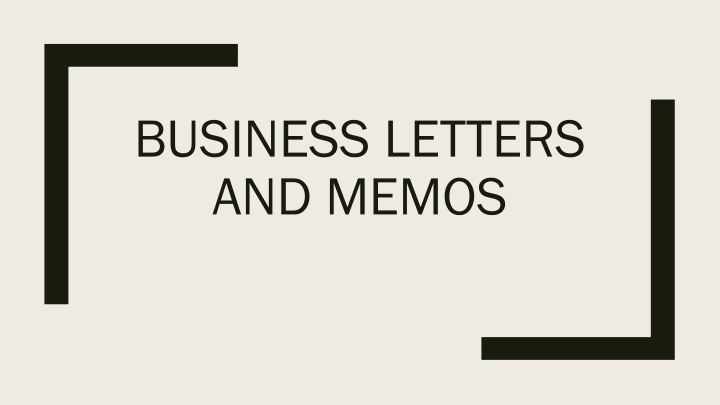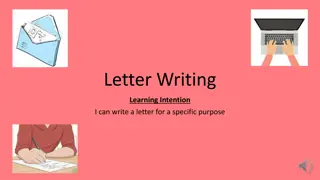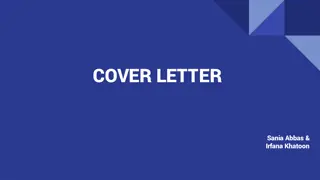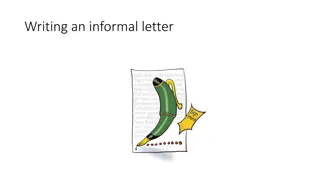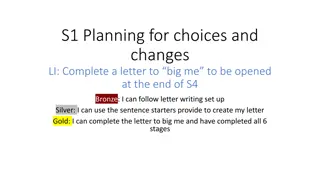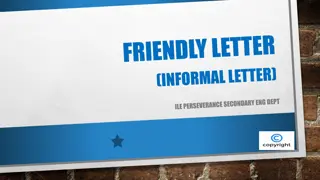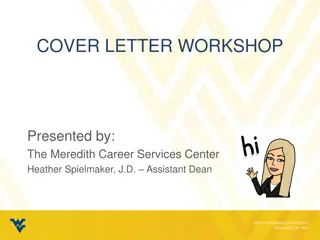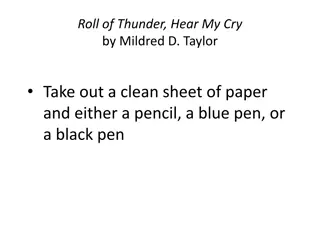Business Writing Style and Common Letter Formats
Explore the nuances of business writing style, from casual to formal, and understand common letter formats such as block, modified block, and simplified. Learn about essential components like salutations, closings, and required terms for effective communication. Discover the balance between casual and formal tones for clarity in communication and avoid unnecessary language affectations.
Download Presentation

Please find below an Image/Link to download the presentation.
The content on the website is provided AS IS for your information and personal use only. It may not be sold, licensed, or shared on other websites without obtaining consent from the author.If you encounter any issues during the download, it is possible that the publisher has removed the file from their server.
You are allowed to download the files provided on this website for personal or commercial use, subject to the condition that they are used lawfully. All files are the property of their respective owners.
The content on the website is provided AS IS for your information and personal use only. It may not be sold, licensed, or shared on other websites without obtaining consent from the author.
E N D
Presentation Transcript
BUSINESS LETTERS AND MEMOS
Recipients Letters Letters X Memos Memos Emails Emails X External Audience Internal Audience X X
Common Letter Formats Block Format Modified Block Format Simplified Format Organization specific format
Required items and terms Letterhead Margins: Left: 1-1.5 inches Right: to 1 inch Salutation: Formal: Dear Mrs. Clinton Informal: Dear Hillary Complimentary closes: Formal: Sincerely, Best regards Informal: Cordially, Thank you, Ciao Reference line Inside address (plus envelopes) Enclosure CC BCC
Business Writing Style Casual Business Formal Conversational Note to a friend Instant message Personal Direct Legal document Contract Term Paper
Business Writing Style Achieve balance of the casual and formal, because style is not concrete Strive for clarity: your goal is to be understood Many ways to facilitate this endeavor
Affectation Use of language that is more formal, technical, or showy than necessary to communicate information to the reader Makes the reader work harder to understand Don t use a big word if a diminutive one will suffice
Simplify finalize initiate optimal prioritize proceed procure rendezvous terminate utilize ameliorate improve commence start compel force comprises is employ use endeavor try fabricate make facilitate help end begin best rank go get meet end use
Affectation Poor: It is the policy of the company to provide internet access to enable employees to conduct the online communication necessary to discharge their responsibilities; such should not be utilized for personal communications or non-business activities. Effective: Employee internet access should be used only for appropriate company business.
Jargon Highly specialized slang that is unique to an occupational or professional group Investors Yield Management ROI P/E ratio Tourism RevPAR Fam Trip Incentive Tour Public ??? Politics Super PAC Lame duck Primaries Bailout Greenwashing Insiders
Buzzwords and Cliches Cash cow Synergize Thinking outside the box Sustainability Ecofriendly Core competency Slam dunk Ducks in a row Leverage (verb) Green ______ Smart ______ It is what it is Robust Giving it 110%
Idioms A group of words that has a special meaning apart from its literal meaning Run for office has nothing to do with exercise meet deplete supply be careful quit hear a rumor to hear something from the original source run into run out of watch out give up hear it through the grapevine Straight from the horse s mouth
Active Construction Actor Action Object / effect Action flows from front of sentence to back Represent the chronological order of events The state agencies implemented the program.
Passive Constructions Object/Effect Action Actor Action flows from back of sentence to front The program was implemented by the state agencies. Vs The state agencies implemented the program.
Passive Constructions Generally avoid it, but can be useful 1. To conceal the doer, subordinate unpleasant news, or soften refusals Authorization for your leave was denied. Examination of our accounting procedures cannot be permitted because of security reasons 2.To emphasize the action, not the agent The data have been compiled by our research department
